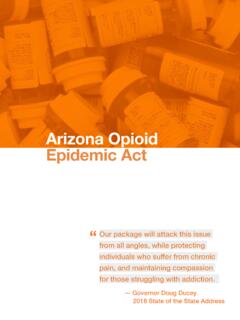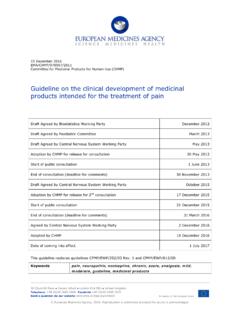Transcription of Ethical use of opioid treatment - World Health Organization
1 1 The Ethical Use of Psychosocially Assisted Pharmacological Treatments for opioid Dependence Adrian Carter Queensland Brain Institute, University of Queensland, St Lucia, QLD 4072 Australia Wayne Hall School of Population Health , University of Queensland Herston, QLD 4066 Australia BACKGROUND DOCUMENT PREPARED FOR THIRD MEETING OF TECHNICAL DEVELOPMENT GROUP (TDG) FOR THE WHO "GUIDELINES FO R PSYCHOSOCIALLY ASSISTED PHARMACOTHERAPY OF opioid DEPENDENCE" 17-21 SEPTEMBER 2007 GENEVA, SWITZERLAND 2 EXECUTIVE SUMMARY The Ethical delivery of psychosocially-assisted pharmacological treatment of opioid dependence is achieved by respecting the following ten basic principles: 1: Human rights of opioid dependent individuals should be respected 2: treatment decisions should be based on the best available evidence 3.
2 treatment decisions should be based on standard principles of medical care ethics 4: Equitable access should be provided to treatment and psychosocial support that best meets the needs of the individual patient 5: treatment should respect and validate the autonomy of the individual 6: Patients should be fully informed about the risks and benefits of treatment choices 7: Programs should create supportive environments and treatment relationships to facilitate treatment 8: There should be co-ordinated treatment of comorbid mental and physical disorders and social factors 9: Programs should include participation of community and other stakeholders 10.
3 The use of legal coercion into treatment for opioid dependence should respect basic Ethical and legal principles 3 Our analysis of the practical application of these basic principles suggests that the Ethical delivery of psychosocially-assisted treatment of opioid dependence treatment should meet a series of minimum requirements. These are: 1) The provision of initial treatment aimed at the stabilisation of the client from the cycle of withdrawal and intoxication to increase their capacity to make major decisions about treatment .
4 The provision of information and requirement of consent to treatment should be limited at this stage until the client is stabilised and their decision making capacity has improved. 2) The use of procedures to ensure the safety of individual clients, reducing their overdose risk by close monitoring during induction onto opioid agonist maintenance treatments; close supervision of dosing; and in abstinence based treatment , providing clear information about the risks of overdose if they return to drug use.
5 3) Provision of enough information to give an understanding of the rationale behind treatment , including the risks and benefits of treatment in the short to long term, and information on other treatment options. 4) Ensuring there is a good understanding by staff and patients of treatment aims that serve the ends of both personal and public Health . 5) Education of treatment staff about the effectiveness of different treatment strategies, and emphasis on the importance of a co-operative and trusting relationship with clients.
6 6) Availability of a range of treatment options that best achieve goals of the client. 7) A defensible drug testing program ( urinalysis) with a rationale that is understood by clients and staff. 8) Adequate dosing that aims to substantially reduce if not eliminate the use of illicit opioids. 9) Supportive treatment that includes regulatory measures that reward compliance with successful treatment , and the use of punitive measures only to protect society, not punish the client.
7 This includes the use of additional counselling in dealing with breaches of regulations. 10) A treatment system with a choice of settings suited to the patients needs and situation specialist clinic vs. primary physicians. 4 11) An appropriate balance between supervised drug consumption and take-away doses for stable clients. 12) An appropriate balance between over-regulation and lack of regulation of clinics that aims to treat as many people as possible, while still providing effective treatment .
8 13) Flexibility to adjust treatment as the situation of the client changes, including the setting, regulations ( drug testing, take home doses) and other social services ( education, housing, employment, and social skills). 14) The protection of privacy and confidentiality of information provided by clients, as for other medical records, that is kept securely and separate and is not accessible to the criminal justice system. 15) The reliance on due process when treating clients under legal coercion and providing clients with a choice from a full range of treatment approaches.
9 16) A range of treatment options made readily available to those entering prison. 17) The co-ordinated treatment of comorbid psychiatric disorders and subclinical symptoms. 18) The availability of social support when required, including employment, housing, education, and social skills. 19) Adequate funding of treatment programs in order to meet the above requirements. 5 ACKNOWLEDGEMENTS We would like to thank the following individuals for their comments during the development and review of this report: Robert Ali, James Bell, Michael Farrell, Mal Parker, Remo Ostini and Jeff Ward.
10 We would also like to acknowledge Vladimir Poznyak and the World Health Organization for their financial support for this review. 6 TABLE OF CONTENTS EXECUTIVE SUMMARY 2 ACKNOWLEDGEMENTS 5 TABLE OF CONTENTS 6 OVERVIEW 8 SECTION 1: INTRODUCTION TO opioid DEPENDENCE AND THE ETHICS OF MEDICAL treatment 10 History of the treatment of opioid Dependence 10 Pharmacological treatment Options for opioid Dependence 12 Ethical Analysis and the Minimum Conditions for the Ethical treatment of opioid Dependence 17 SECTION 2.













